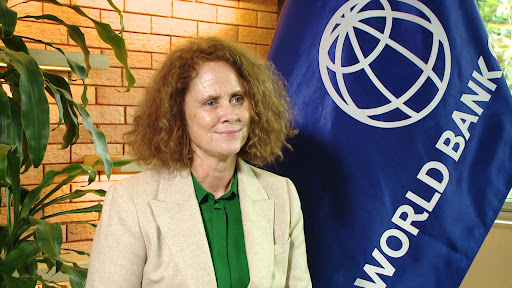WB Country Director: Conditions ripe for Viet Nam to shift to flexible adaptation to COVID-19
VGP - The conditions are ripe for the Vietnamese Government to shift to a more flexible adaptation to the pandemic, said Ms. Carolyn Turk, World Bank Country Director told VGP in a recent interview.
 |
|
World Bank Country Director for Viet Nam Carolyn Turk |
Commenting on the Government's decision to switch away from "Zero COVID-19" to safe and flexible adaptation to the pandemic, Turk said this is a "calculated decision" that responds well to the evolving situation as there have been high economic costs to keeping lockdowns in the last quarter, with the GDP in Q3-2021 contracting by 6.17 percent, the sharpest drop since quarterly data were compiled in the country.
The decision has implications for the overall growth for this year, which in our estimate would be in the 2 percent to 2.5 percent range, about 4 percentage points lower than pre-COVID growth performance.
The highly transmissible Delta variant has also shown us that a zero COVID-19 policy is not sustainable. Lockdown measures have been able to slow the spread of the virus, but can not stop the variant and thus show us that we need to learn to live with the virus.
Ultimately, containing COVID-19 means avoiding an overload of the hospital system (especially the capacity in Intensive Care Unit (ICU) beds) and now this can be achieved even with a significant number of cases.
Turk hailed Viet Nam for having been quickly vaccinating its population. Ha Noi and Ho Chi Minh City have seen almost all of its 18 dwellers receiving the jabs, while nationwide, more than 77 million doses have been administered.
The country's capacity for vaccination has been significantly strengthened, with an average of about 1.3 million doses given a day for the past month, providing the necessary protection for the people and relieving the burden on the health system.
As of late October, about 55 percent of the population had received at least one dose and 23 percent have been fully vaccinated. The conditions are ripe for the Government to shift to a more flexible adaptation to the pandemic.
She, however, said shifting to the new policy doesn’t mean that the Government and people shouldn’t remain vigilant. The virus can continue to mutate and spread, thus, adherence to the 5K principles, a strong test and trace system, plus a continuation of the quick roll out of vaccination should be some of the keys to the new strategy.
Regarding the significance of the mentioned-above Government’s decision to foreign business community in Viet Nam, Turk commented that adapting flexibly to and living safely with COVID-19 is an important and timely decision for the economy and businesses.
During the recent lockdown, businesses curtailed the provision of goods and services, production and manufacturing facilities were unable to operate normally, transport and logistics were disrupted, while they had to bear various costs. The economy as a whole, and businesses in particular, suffered.
However, the resumption of economic activities after a lengthy lockdown is facing market frictions as seen around the world. Therefore, to facilitate economic recovery, easing logistics constraints, continued testing and vaccination and encouraging labor mobility should be priorities, she said.
Turk recommended the authorities adopt a more expansionary fiscal policy and use the various fiscal tools available to support the economic rebound, including easing procedural rigidities in the budget to spend the planned current budget, accelerating implementation of planned public investment, and expanding social protection to households and to formal and informal workers.
In pursuance of effective COVID-19 containment and economic recovery, Turk said there are three factors that will matter.
First of all, vaccinating as many people as soon as possible is a first priority to help revive businesses and the economy. It will help keep workers and people relatively safe, businesses to stay open, and economic activities to resume with less interruption.
At the same time, Viet Nam needs action to contain future possible outbreaks. Adapting flexibly to COVID – 19 will require protection of employees and clients, mass vaccination, masks, social distancing and regular testing for the foreseeable future.
And finally, digitalizing the way Vietnamese Government and businesses are run will help them be more agile and resilient. The government could consider supporting companies to adapt to the new environment by adopting new processes and technology, to ensure that Vietnamese companies and foreign companies operating in Viet Nam remain competitive.
By Tuan Dung

